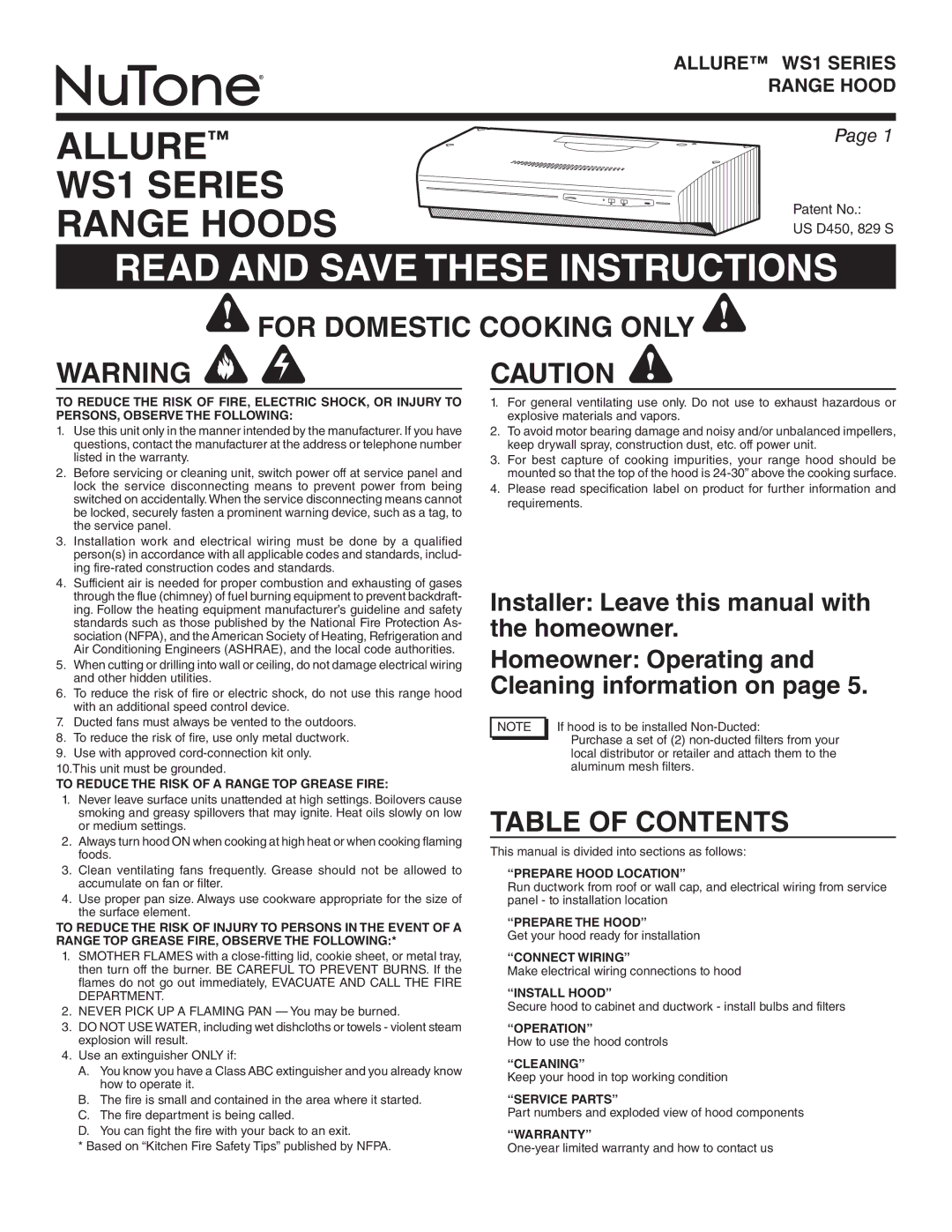
ALLURE™ WS1 SERIES RANGE HOOD
ALLURE™ WS1 SERIES RANGE HOODS
Page 1
Patent No.:
US D450, 829 S
READ AND SAVE THESE INSTRUCTIONS
! | FOR DOMESTIC COOKING ONLY ! | ||
WARNING |
|
| CAUTION ! |
TO REDUCE THE RISK OF FIRE, ELECTRIC SHOCK, OR INJURY TO PERSONS, OBSERVE THE FOLLOWING:
1.Use this unit only in the manner intended by the manufacturer. If you have questions, contact the manufacturer at the address or telephone number listed in the warranty.
2.Before servicing or cleaning unit, switch power off at service panel and lock the service disconnecting means to prevent power from being switched on accidentally. When the service disconnecting means cannot be locked, securely fasten a prominent warning device, such as a tag, to the service panel.
3.Installation work and electrical wiring must be done by a qualified person(s) in accordance with all applicable codes and standards, includ- ing
4.Sufficient air is needed for proper combustion and exhausting of gases through the flue (chimney) of fuel burning equipment to prevent backdraft- ing. Follow the heating equipment manufacturer’s guideline and safety standards such as those published by the National Fire Protection As- sociation (NFPA), and the American Society of Heating, Refrigeration and Air Conditioning Engineers (ASHRAE), and the local code authorities.
5.When cutting or drilling into wall or ceiling, do not damage electrical wiring and other hidden utilities.
6.To reduce the risk of fire or electric shock, do not use this range hood with an additional speed control device.
7.Ducted fans must always be vented to the outdoors.
8.To reduce the risk of fire, use only metal ductwork.
9.Use with approved
10.This unit must be grounded.
TO REDUCE THE RISK OF A RANGE TOP GREASE FIRE:
1.Never leave surface units unattended at high settings. Boilovers cause smoking and greasy spillovers that may ignite. Heat oils slowly on low or medium settings.
2.Always turn hood ON when cooking at high heat or when cooking flaming foods.
3.Clean ventilating fans frequently. Grease should not be allowed to accumulate on fan or filter.
4.Use proper pan size. Always use cookware appropriate for the size of the surface element.
TO REDUCE THE RISK OF INJURY TO PERSONS IN THE EVENT OF A RANGE TOP GREASE FIRE, OBSERVE THE FOLLOWING:*
1.SMOTHER FLAMES with a
2.NEVER PICK UP A FLAMING PAN — You may be burned.
3.DO NOT USE WATER, including wet dishcloths or towels - violent steam explosion will result.
4.Use an extinguisher ONLY if:
A.You know you have a Class ABC extinguisher and you already know how to operate it.
B.The fire is small and contained in the area where it started.
C.The fire department is being called.
D.You can fight the fire with your back to an exit.
*Based on “Kitchen Fire Safety Tips” published by NFPA.
1.For general ventilating use only. Do not use to exhaust hazardous or explosive materials and vapors.
2.To avoid motor bearing damage and noisy and/or unbalanced impellers, keep drywall spray, construction dust, etc. off power unit.
3.For best capture of cooking impurities, your range hood should be mounted so that the top of the hood is
4.Please read specification label on product for further information and requirements.
Installer: Leave this manual with the homeowner.
Homeowner: Operating and Cleaning information on page 5.
NOTE | If hood is to be installed |
| Purchase a set of (2) |
| local distributor or retailer and attach them to the |
| aluminum mesh filters. |
TABLE OF CONTENTS
This manual is divided into sections as follows:
“PREPARE HOOD LOCATION”
Run ductwork from roof or wall cap, and electrical wiring from service panel - to installation location
“PREPARE THE HOOD”
Get your hood ready for installation
“CONNECT WIRING”
Make electrical wiring connections to hood
“INSTALL HOOD”
Secure hood to cabinet and ductwork - install bulbs and filters
“OPERATION”
How to use the hood controls
“CLEANING”
Keep your hood in top working condition
“SERVICE PARTS”
Part numbers and exploded view of hood components
“WARRANTY”
